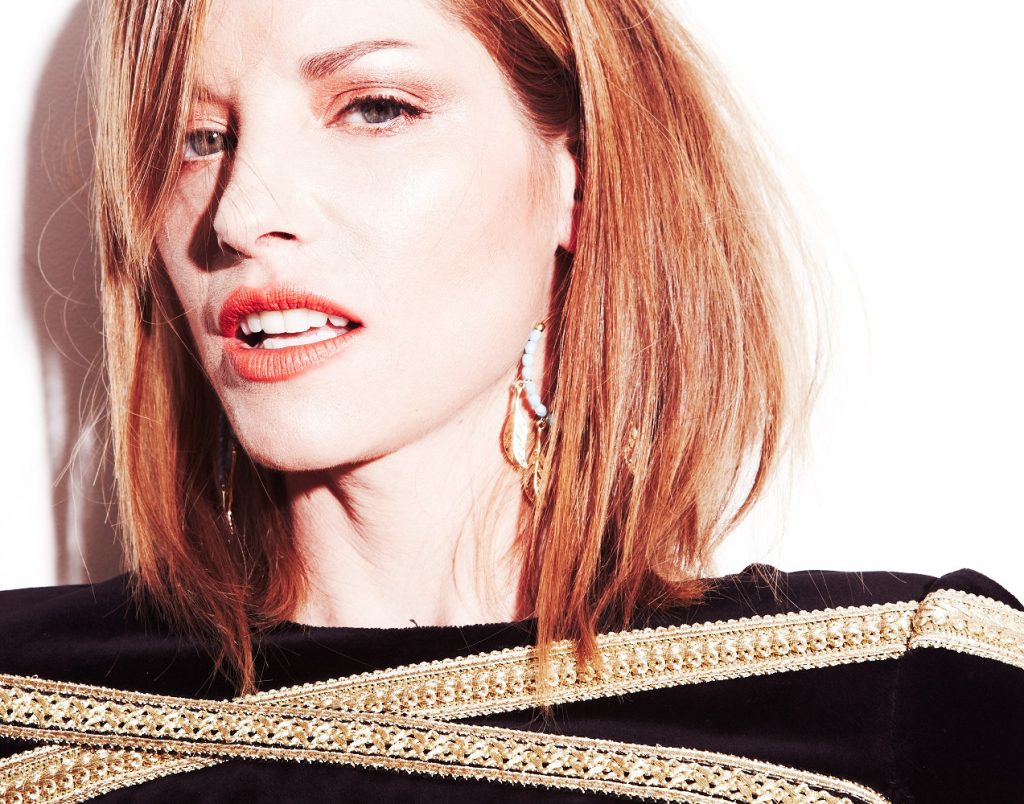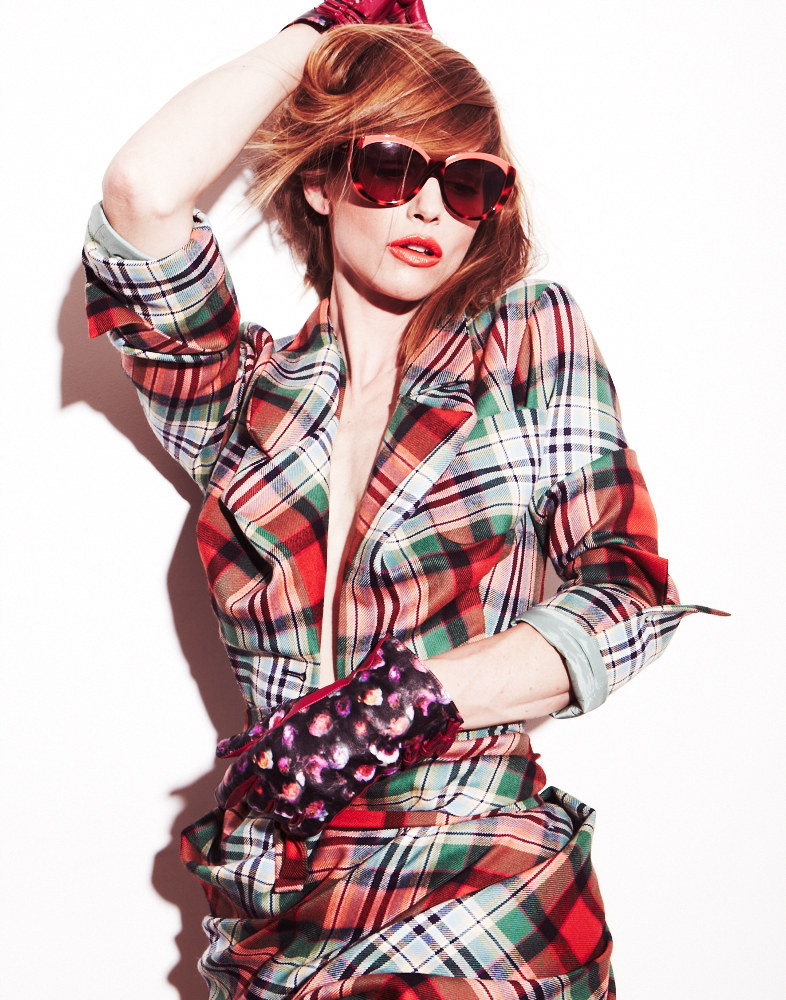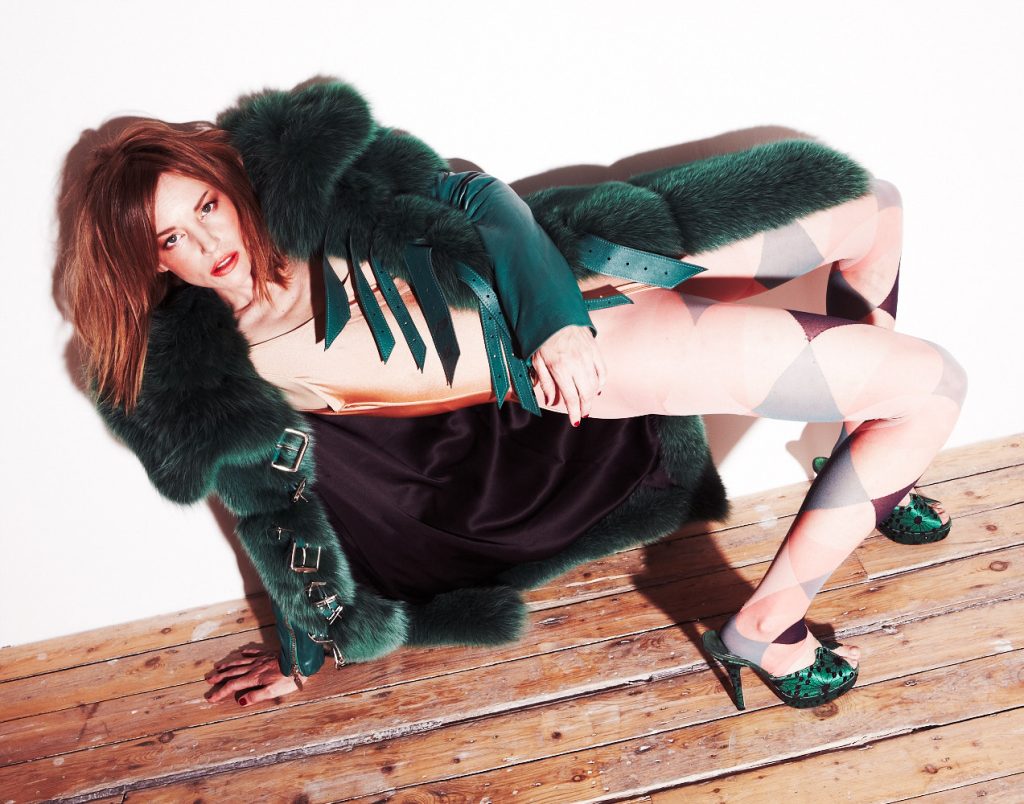
by Zoe Stagg
photography by Mark Cant
“I can’t imagine a future where we’ll be spending more on our armed forces instead of less, because I think people are getting fed up with the cutbacks in domestic policy.”
Whether actor Sienna Guillory is facing zombies, fans, or her twin daughters, the role she plays is decidedly true. “I’m less concerned with myself and my perception than I was before I had kids, and I think I approach things a bit more head on.” For the English-born daughter of an American folk guitarist and a British model, this approach is mirrored precisely in her current work: the most recent installment of the Resident Evil franchise, Resident Evil: Retribution; and the indie horror flick, Wicked Within. “It’s exciting to be able to flip a switch and dominate. Being a mum does help that, especially because I’ve got two girls, I really like the idea that they’ll grow up in a world where there is less violence toward women and where men know how scary we can be.”
Embodying seemingly opposite poles in her roles on and off screen, the common denominator is this: she’s self-assured enough to rock the foundations of everyone around her. For someone who took to acting to have a chance to be someone, anyone else, the one role she’s grown into is exactly what she was running from — herself. “In Hitchhiker’s Guide to the Galaxy, there’s this gun – you shoot it at people and it makes them see the world from your perspective. And then they turn it on Electra and she says ‘It won’t work on me – I’m already a woman.’”
The roles available to women in sci-fi fantasy Hollywood and in real life don’t always match, but they carry a lot of the same conflict. “I’m always interested in the intricate social politics of being a woman. When you’re holding yourself back in one hand and letting yourself go in the other. It’s really nice to get to do something like Resident Evil because it feels really good to unleash some dread and violence. I think we’re all a bit frequently warmed by violence. It’s that desire to wreak havoc and create chaos and feel powerful — it’s a liberating thing.”
Speaking her mind is just part of that liberation, and you’ll find her really doing it, 140 characters at a time, on Twitter (@guillorybe.) “It’s fun for the most part. You’re on it and you think ‘This is great!’ You’re having these little chats with people who are really interested like yourself — then sometimes you just get dickheads.” Luckily, dickheads on Twitter don’t fare any better than zombies.

Sienna knows that while she’s a tough role model onscreen, she’s cast in the same way at home as mum to her twin daughters. (Except with fewer zombies.) “I don’t dress them as girls. They’re kids. A lot of my friends have little boys and they won’t play with my girls when they’re wearing dresses, but they’ll play with them when they’re dressed as a normal kid. I think that stereotyping boys and girls, it starts really young – ‘Oh my goodness, look at you! You look beautiful.’ And then they think that’s the most important thing. I think there’s a bit more to it than that, you can build a child’s self-esteem in other ways, like ‘What can you do? Tell me what you can do.’ We can talk about what we can do rather than what we look like.”
Building self confidence at home is one thing, but eventually her daughters will have to inherit a part of this big marble – one that can seem grimmer and more hopeless with each news report. “It’s a big scary mess, isn’t it? It’s chaos.” Chaos, but with a faint glimmer in the distance. “I am encouraged generally, looking around me, just in terms of the marketplace, the stuff you buy, people are more aware of where is it coming from, how is it made, is it okay, is it ethical? I think that people are becoming more and more aware, and the parameters of what’s allowable are becoming narrower.” Increased military might is included in that list of no-nos. “I can’t imagine a future where we’ll be spending more on our armed forces instead of less, because I think people are getting fed up with the cutbacks in domestic policy.”
With real-world wars fighting for attention against sci-fi battles waged in games, and with the two-dimensional becoming three (like in the recent Batman tragedy), are fictional worlds and technology blurring any sense of consequence and desensitizing us? Quite the contrary, says Sienna. Escaping into fiction, even violent fiction, might actually be good for us. “In the same way that you’d read a book, when you’re reading a story you’re involved in, you’re drawn to violent games or books that terrify because that’s the purpose and nature of storytelling: it’s both to be shocking and scary. Stories are warnings. We live vicariously through other people’s thrills and spills. I think with a purpose to it, it gives an emotional outlet. When you’re playing those games, you’re emotionally in them.”

The games, the movies, then, are all a safe place to put the thoughts and actions that might do real damage in the world at large – and they allow us release. “We all want to be in a state of flow responding to our instincts. Like mums when their kids are going mental, you know that they just want to slap them and then they just count to ten and hold it and think about what’s the responsible thing to do and what’s the best thing to do. Self-control is – I so love being on set and not having to use it. If you’ve got the emotional outlet in literature or in film… I think it’s important, I think it’s therapeutic.”
So are the weapon-wielding ferocious fighters she plays a bit like her therapeutic outlet – just like video games are for other people?
A pause, a sheepish giggle where the answer has time to contradict the delivery, and all of the roles she plays collide into each other at once – “Yup.”
